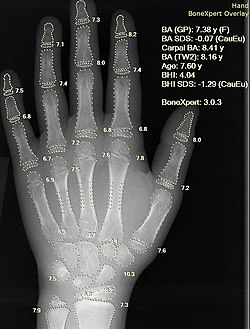
Back الذكاء الاصطناعي في المجال الصحي Arabic Intel·ligència artificial en el camp de la salut Catalan Umělá inteligence ve zdravotnictví Czech Künstliche Intelligenz in der Medizin German Inteligencia artificial en el campo de la salud Spanish Tehisintellekt tervishoius Estonian هوش مصنوعی در مراقبت پزشکی Persian Tekoäly terveydenhuollossa Finnish Intelligence artificielle dans la santé French स्वास्थ्य सेवा में कृत्रिम बुद्धिमत्ता Hindi

| Part of a series on |
| Artificial intelligence (AI) |
|---|
Artificial intelligence in healthcare is the application of artificial intelligence (AI) to analyze and understand complex medical and healthcare data. In some cases, it can exceed or augment human capabilities by providing better or faster ways to diagnose, treat, or prevent disease.[1][2][3]
As the widespread use of AI in healthcare is still relatively new, research is ongoing into its applications across various medical subdisciplines and related industries. AI programs are being applied to practices such as diagnostics,[4] treatment protocol development,[5] drug development,[6] personalized medicine,[7] and patient monitoring and care.[8] Since radiographs are the most commonly performed imaging tests in radiology, the potential for AI to assist with triage and interpretation of radiographs is particularly significant.[9]
Using AI also presents unprecedented ethical concerns related to issues such as data privacy, automation of jobs, and amplifying already existing biases.[10] Furthermore, new technologies such as AI are often resisted by healthcare leaders, leading to slow and erratic adoption.[11] In contrast, there are also several cases where AI has been put to use in healthcare without proper testing.[12][13][14][15] A systematic review and thematic analysis in 2023 showed that most stakeholders including health professionals, patients, and the general public doubted that care involving AI could be empathetic.[16] Moreover, meta-studies have found that the scientific literature on AI in healthcare often suffers from a lack of reproducibility.[17][18][19][20]
- ^ "Developing an aging clock using deep learning on retinal images". ai.googleblog.com. 2023-04-11. Retrieved 2023-06-01.
- ^ Mullainathan S, Obermeyer Z (May 2022). "Solving medicine's data bottleneck: Nightingale Open Science". Nature Medicine. 28 (5): 897–899. doi:10.1038/s41591-022-01804-4. PMID 35534570. S2CID 248668494.
- ^ Jimma BL (2023-01-16). "Artificial intelligence in healthcare: A bibliometric analysis". Telematics and Informatics Reports. 9: 100041. doi:10.1016/j.teler.2023.100041.
- ^ Lyakhova UA, Lyakhov PA (August 2024). "Systematic review of approaches to detection and classification of skin cancer using artificial intelligence: Development and prospects". Computers in Biology and Medicine. 178: 108742. doi:10.1016/j.compbiomed.2024.108742. PMID 38875908.
- ^ Sankar H, Alagarsamy R, Lal B, Rana SS, Roychoudhury A, Agrawal A, et al. (2024). "Role of artificial intelligence in treatment planning and outcome prediction of jaw corrective surgeries using 3-D imaging: A systematic review". Oral Surgery, Oral Medicine, Oral Pathology, and Oral Radiology. 139 (3): 299–310. doi:10.1016/j.oooo.2024.09.010. PMID 39701860.
- ^ Qiu Y, Cheng F (April 2024). "Artificial intelligence for drug discovery and development in Alzheimer's disease". Current Opinion in Structural Biology. 85: 102776. doi:10.1016/j.sbi.2024.102776. PMID 38335558.
- ^ Ghanem M, Ghaith AK, Bydon M (2024). "Artificial intelligence and personalized medicine: transforming patient care". The New Era of Precision Medicine. Elsevier. pp. 131–142. doi:10.1016/b978-0-443-13963-5.00012-1. ISBN 978-0-443-13963-5. Retrieved 2024-10-10.
- ^ Snider V, Homsi K, Kusnoto B, Atsawasuwan P, Viana G, Allareddy V, et al. (May 2024). "Clinical evaluation of Artificial Intelligence Driven Remote Monitoring technology for assessment of patient oral hygiene during orthodontic treatment". American Journal of Orthodontics and Dentofacial Orthopedics. 165 (5): 586–592. doi:10.1016/j.ajodo.2023.12.008. PMID 38363256.
- ^ Adams SJ, Henderson RD, Yi X, Babyn P (February 2021). "Artificial Intelligence Solutions for Analysis of X-ray Images". Canadian Association of Radiologists Journal. 72 (1): 60–72. doi:10.1177/0846537120941671. PMID 32757950. S2CID 221036912.
- ^ Floridi L, Luetge C, Pagallo U, Schafer B, Valcke P, Vayena E, et al. (2019-09-01). "Key Ethical Challenges in the European Medical Information Framework". Minds and Machines. 29 (3): 355–371. doi:10.1007/s11023-018-9467-4. hdl:2318/1728336. ISSN 1572-8641. S2CID 49668711.
- ^ Petersson L, Larsson I, Nygren JM, Nilsen P, Neher M, Reed JE, et al. (July 2022). "Challenges to implementing artificial intelligence in healthcare: a qualitative interview study with healthcare leaders in Sweden". BMC Health Services Research. 22 (1): 850. doi:10.1186/s12913-022-08215-8. PMC 9250210. PMID 35778736.
- ^ Andrew Wong; Erkin Otles; John P. Donnelly; Andrew Krumm; Jeffrey McCullough; Olivia DeTroyer-Cooley; Justin Pestrue; Marie Phillips; Judy Konye; Carleen Penoza; Muhammad Ghous; Karandeep Singh (June 21, 2021). "External Validation of a Widely Implemented Proprietary Sepsis Prediction Model in Hospitalized Patients". JAMA Internal Medicine. 181 (8): 1065–1070. doi:10.1001/jamainternmed.2021.2626. PMC 8218233. PMID 34152373.
{{cite journal}}: CS1 maint: multiple names: authors list (link) - ^ Simonite T (June 21, 2021). "An Algorithm That Predicts Deadly Infections Is Often Flawed". Wired Magazine.
- ^ Simonite T (October 24, 2019). "A health care algorithm offered less care to black patients". Wired Magazine.
- ^ Ross C, Swetlitz I (September 5, 2017). "IBM pitched its Watson supercomputer as a revolution in cancer care. It's nowhere close". Stat.
- ^ Vo V, Chen G, Aquino YS, Carter SM, Do QN, Woode ME (December 2023). "Multi-stakeholder preferences for the use of artificial intelligence in healthcare: A systematic review and thematic analysis". Social Science & Medicine. 338 (1): 116357. doi:10.1016/j.socscimed.2023.116357. PMID 37949020.
- ^ Scudellari M (March 29, 2021). "Machine Learning Faces a Reckoning in Health Research". IEEE Spectrum.
- ^ Matthew B. A. McDermott, et al. (March 24, 2021). "Reproducibility in machine learning for health research: Still a ways to go". Science Translational Medicine. 13 (586). doi:10.1126/scitranslmed.abb1655. PMID 33762434.
- ^ Varoquaux G, Cheplygina V (April 12, 2022). "Machine learning for medical imaging: methodological failures and recommendations for the future". npj Digital Medicine. 5 (48): 48. doi:10.1038/s41746-022-00592-y. PMC 9005663. PMID 35413988.
- ^ Sohn E (January 9, 2023). "The reproducibility issues that haunt health-care AI". Nature. 613 (7943): 402–403. Bibcode:2023Natur.613..402S. doi:10.1038/d41586-023-00023-2. PMID 36624237.
© MMXXIII Rich X Search. We shall prevail. All rights reserved. Rich X Search
